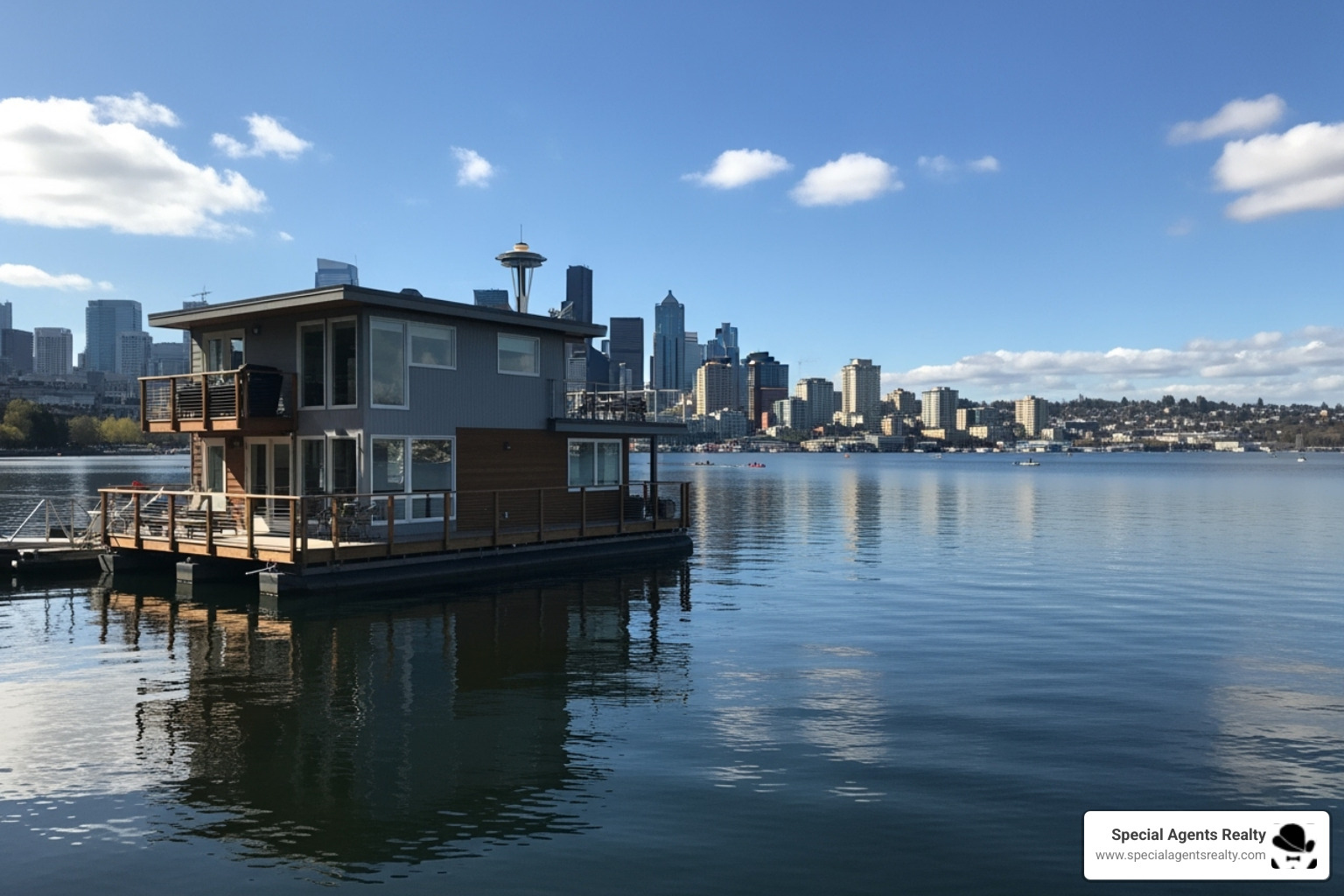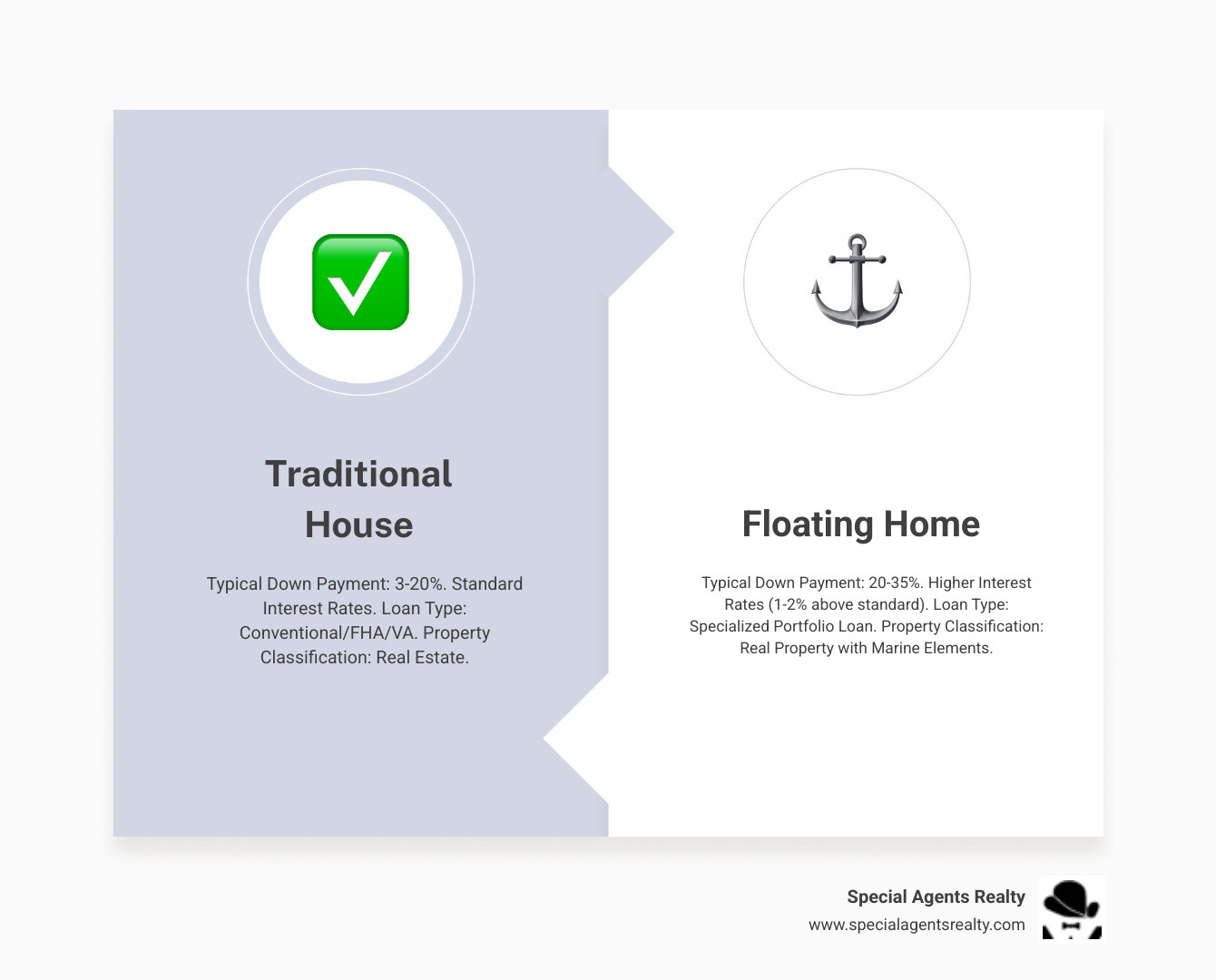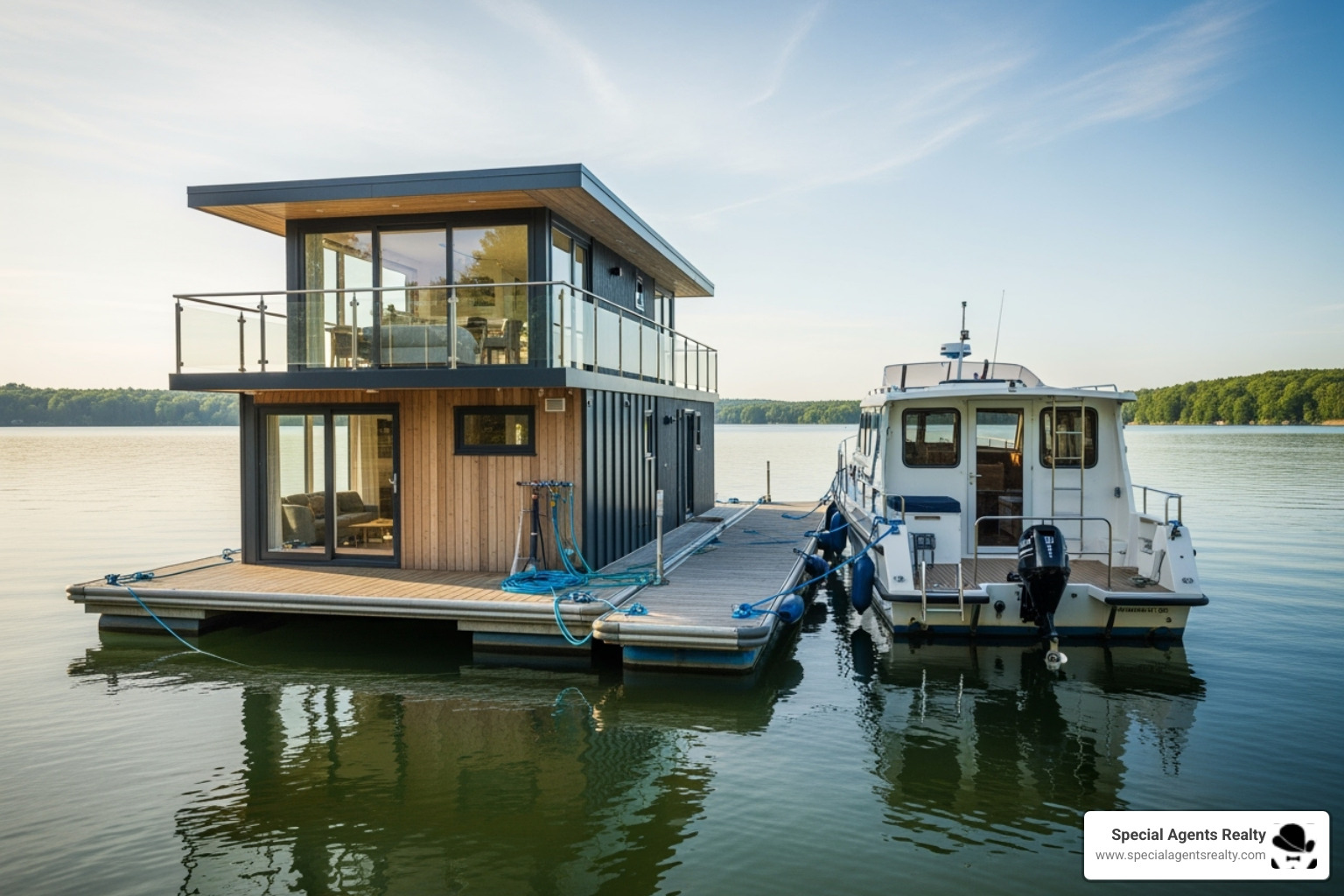
Why Floating Home Financing Seattle Requires a Different Approach
Floating home financing Seattle is a specialized niche that requires different lenders and expectations than traditional home buying. Unlike conventional mortgages, only a handful of local banks and credit unions offer loans for these unique properties. They treat your floating home as real estate, but with stricter terms than a house on land.
Quick Answer: What You Need to Know
- Specialized Lenders Only: Sound Community Bank, Banner Bank, and Pacific Crest Savings Bank are the primary options
- Higher Down Payment: Expect 20-35% down, compared to 3-20% for traditional homes
- Higher Interest Rates: Typically 1-2% above standard mortgage rates
- Owner-Occupied: Most loans require you to live in the home
- Specific Locations: Primarily Lake Union, Portage Bay, and Lake Washington
- Loan Terms: Often include balloon payments (5-10 years) or 15-30 year amortization
Seattle's approximately 520 floating homes are permanent residences moored to docks with city utilities, classifying them as real property. This unique status means most traditional mortgage lenders won't touch them. The challenge is finding a lender who understands this difference. The few that do offer portfolio loans, meaning they keep the loan on their books. This scarcity of lenders gives them more pricing power, which translates to higher rates and stricter terms for you.
The good news is that with proper preparation and expert guidance, securing financing is absolutely achievable. This guide walks you through everything you need to know, from understanding the unique loan requirements to connecting with the right lenders.

Understanding the Difference: Floating Home vs. Houseboat Financing
When dreaming of life on Seattle's waters, it's crucial to know that not all floating homes are houseboats. This isn't just semantics—it's the difference between getting a specialized mortgage and a boat loan.
Floating homes are permanent residences moored to a dock, connected to city utilities like water and sewer, and have a street address. They are legally classified as real property, just like a house on land. Seattle has about 520 of these homes, mostly on Lake Union, Portage Bay, and Lake Washington.
Houseboats are vessels with propulsion systems. They are considered personal property, like an RV or boat, and are governed by marine regulations.
This distinction determines everything about your financing. For a deeper dive into these unique properties, check out our guide on More info about Floating Homes.

Why Traditional Mortgages Don't Apply
Traditional mortgages are built for properties permanently attached to land. Floating homes, despite being permanent residences, don't fit this model. Large national banks lack underwriting guidelines for them, and more importantly, there's no secondary market to sell these loans to. This means the few lenders who finance floating homes must keep them on their own books as a portfolio loan.
When lenders can't sell the loan to spread their risk, they become more cautious. They require larger down payments, charge higher interest rates, and impose stricter terms. Even with a stellar What Is a FICO Score, the unique nature of the collateral dictates a specialized financing approach.
Floating Home vs. Houseboat: A Critical Distinction for Lenders
For lenders, the property classification is everything. Floating homes are treated like real estate. They have physical addresses, permanent moorage, and are subject to property taxes. While the financing is specialized, it resembles a mortgage. You can expect interest rates 1-2% higher than conventional loans, with terms from 15 to 30 years.
Houseboats are financed like boats or RVs. Lenders view them as depreciating personal property. This results in much shorter loan terms (often maxing out at 20 years) and interest rates that can be 3% or more above traditional mortgage rates. You'll also need specialized vessel inspections. The investment considerations are completely different, which is why approaches to Houseboats Investments vary so widely.
Before you start your search, knowing exactly what type of floating residence you're pursuing is the foundation of your financing journey.
Key Lenders for Floating Home Financing in Seattle
When you're looking for floating home financing Seattle, you'll be working with a small group of specialized local banks and credit unions. Large national banks simply don't serve this niche market. The lenders who do offer portfolio loans, which they fund and hold themselves. This allows them to handle unique properties but also means they assume all the risk, leading to stricter terms and higher rates for borrowers.
The upside is their deep expertise in Seattle's moorage agreements, regulations, and appraisal challenges. Understanding The Advantages of Different Types of Mortgage Lenders highlights why these local specialists are essential for floating home loans.

Local Banks and Credit Unions
Several local institutions have developed programs specifically for floating home buyers.
- Sound Community Bank: A well-known lender in the floating home community, offering flexible terms for homes on Lake Washington, Lake Union, and Portage Bay. They typically require a 20% down payment and offer various loan structures, including 15-year fixed loans or amortizations with 5- or 10-year balloon payments. Explore their offerings at Sound Community Bank.
- Banner Bank: Serving both Seattle and Portland, Banner offers 20 or 30-year fully amortized fixed-rate loans. They also provide options for refinancing and custom construction. A minimum 20% down payment is typical. Learn more at Banner Bank.
- Pacific Crest Savings Bank: This bank specializes in floating homes on co-op and condo docks on Lake Union and Portage Bay. Their narrow focus gives them deep expertise in these specific communities. Connect with them at Pacific Crest Savings Bank.
When speaking with these lenders, be prepared to ask about current rates, down payment requirements, eligibility criteria, the appraisal process, and closing costs.
Preparing Your Loan Application
A strong application is key for a portfolio loan. Lenders will scrutinize your finances, so be prepared with the following:
- Strong Credit Score: A high FICO score is essential to demonstrate you are a responsible borrower.
- Verified Assets: You'll need bank and investment statements to prove you have funds for the down payment and reserves. Our guide on Documenting Your Assets Verifying Your Down Payment can help.
- Low Debt-to-Income (DTI) Ratio: A lower DTI ratio shows you have ample room in your budget for a mortgage payment.
- Stable Income and Employment: Lenders want to see consistent work history. Be ready with pay stubs, W-2s, and at least two years of tax returns.
Gathering these documents beforehand will streamline the process. For a full checklist, see Items You Need for When Applying for a Loan.
The Nuts and Bolts: Loan Terms, Rates, and Requirements
Understanding the specific terms and requirements is the key to navigating floating home financing Seattle. The numbers, terms, and requirements all shift when your dream home happens to float, but knowing what to expect makes the process manageable.

Typical Loan Terms for Seattle Floating Homes
Loan terms for floating homes differ significantly from conventional mortgages because lenders view them as higher risk.
- Down Payment: Expect to put down a minimum of 20%. Some lenders may require up to 35%, depending on the property and your financial profile. This large down payment gives the lender security. Start planning with our guide to Your Savings and Down Payment.
- Interest Rates: Rates are typically 1 to 2 percentage points higher than for conventional loans. This premium reflects the lender's increased risk.
- Loan Structure: You may find straightforward 20 or 30-year fixed-rate loans, similar to a traditional mortgage. However, loans with balloon payments are also common. For example, a loan might be amortized over 30 years, but the entire remaining balance is due in 5 or 10 years, requiring you to refinance or sell.
Eligibility Criteria for Your Floating Home
It's not just about whether you qualify; the floating home itself has to meet specific criteria before a lender will finance it.
- Owner-Occupied: Most loans are for primary residences only, not investment or vacation properties.
- Construction Codes: The home must meet all City of Seattle safety and construction regulations.
- Permanent Moorage: The home must be permanently moored to a dock with secure rights, often on a co-op or condominium dock.
- Utility Connections: It must be connected to city utilities like water, sewer, and electricity to be considered real property.
- Inspections: A professional dive survey of the float and a structural inspection of the home are required to ensure the property is sound.
Unique Challenges in the Floating Home Financing Seattle Process
Be prepared for a few problems unique to floating homes. Knowing them ahead of time will help you plan accordingly.
- Appraisals: With only about 520 floating homes in Seattle, finding comparable sales is difficult. This can lead to longer appraisal times and conservative valuations.
- Marine Surveys: You'll need a specialized dive survey to inspect the underwater components, which is an extra step and cost (typically $350-$550).
- Insurance: Specialized marine insurance is required and is more expensive than standard homeowners insurance.
- Closing Times: The process often takes longer due to specialized appraisals, surveys, and legal documents like moorage agreements. Patience is key. Understanding Title Insurance is also crucial, especially with co-op docks.
Navigating the Process: From Pre-Approval to Long-Term Ownership
Once you understand the nuances of floating home financing Seattle, the next step is navigating the process. This journey is far more enjoyable when you have the right team guiding you and a clear picture of what life on the water truly entails.

The Crucial Role of a Specialized Real Estate Agent
In the niche market of Seattle floating homes, a specialized agent is your most valuable asset. General real estate knowledge isn't enough. An expert brings deep connections and experience that are critical for success. We connect you with the right lenders for Getting a Legitimate Lender and Getting Pre-Approved, help you steer the complex inspection process, interpret moorage agreements, and often find off-market listings through our community network. At Special Agents Realty, this is our specialty. Our focused expertise means a smoother process and better outcomes for you.
Refinancing Your Floating Home Loan
Refinancing your floating home loan is possible and can be a smart move if interest rates have dropped or your financial situation has improved. The process is similar to your original loan, requiring you to work with a specialized lender and provide updated financial documentation. A new appraisal will be needed to determine your home's current value, and lenders will have strict Loan-to-Value (LTV) limits, often around 70%. Refinancing can help you secure a lower rate or cash out equity, but it's important to weigh the closing costs against the potential savings.
Long-Term Financials and Government Support
Owning a floating home involves a unique financial picture. Here's what to consider for the long term:
- Ongoing Costs: Beyond your mortgage, budget for monthly moorage fees (which can be substantial), property taxes, specialized marine insurance, and a dedicated maintenance fund for the float and structure.
- Appreciation Potential: Scarcity is a major advantage. With only about 520 floating homes and no new ones being built, they have historically shown strong appreciation. However, the niche market can mean a longer selling time. Our guide on 5 Things to Know When Buying a Houseboat and Floating Home offers more insight.
- Government Support: There are no FHA, VA, or other federal loan programs for floating homes. However, local and state legislation has been passed to protect floating home communities and legitimize their status. This adds stability to the market and makes lenders more comfortable, which is a crucial, if indirect, form of support for buyers.
Frequently Asked Questions about Floating Home Financing
We get a lot of questions about floating home financing Seattle. These are some of the most common ones we hear.
Why is it harder to get a loan for a floating home?
It's harder because floating homes are a niche property type that doesn't fit the standard models of large national banks. They are considered higher risk due to:
- Unique Collateral: The property floats, requiring specialized maintenance and valuation.
- Lack of Secondary Market: Lenders can't sell these loans to investors, so they must keep them as portfolio loans.
- Small Resale Market: With only about 520 floating homes in Seattle, the market is tiny compared to traditional real estate.
This is why only a few local, specialized lenders offer floating home financing Seattle.
What is the minimum down payment for a floating home in Seattle?
The minimum down payment is 20%. However, depending on your financial profile and the specific property, some lenders may require as much as 35%. The larger down payment reduces the lender's risk.
Is a Seattle floating home a good investment?
Yes, it can be an excellent investment, but it's important to weigh the pros and cons.
- Pros: The extreme scarcity (around 520 total) drives strong value and appreciation. These homes often command a premium price per square foot, sometimes exceeding $1,000 per square foot.
- Cons: You'll face higher ongoing costs for moorage fees, marine insurance, and specialized maintenance. The niche market can also mean a longer time to sell.
It's a fantastic investment in your lifestyle, with financial appreciation as a significant bonus. It is not ideal for someone looking for a pure investment property.
Float Your Dream into Reality
Securing floating home financing Seattle is a unique journey, but it's one that leads to an extraordinary lifestyle. With the right preparation and an expert team, the path to waking up on the water is entirely achievable. This guide has outlined the key steps: understanding the specialized loans, meeting property requirements, and working with the right lenders.
Imagine watching seaplanes from your window or kayaking from your front door. This isn't just a home; it's a change of how you experience Seattle.
The path to ownership requires specialized expertise, and that's where we excel. The team at Special Agents Realty has dedicated years to mastering Seattle's floating home market. We know the lenders, the inspectors, and the intricacies of moorage agreements. We guide you from your first question to the moment you step aboard as an owner.
Ready to explore this unique lifestyle? Explore Seattle floating homes and houseboats today and let us help you cast off into your new waterfront life.
.avif)





